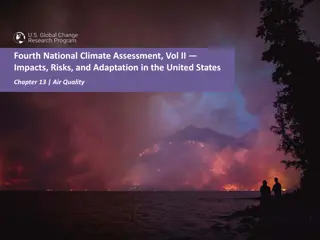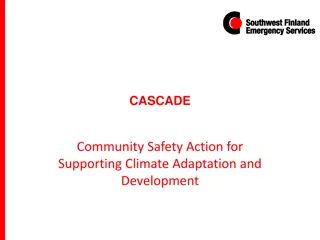Regional Framework for Action on Health and Climate Change
Regional Framework for Action on Health and Climate Change outlines pillars focusing on health protection from climate change through governance, policy, and engagement. It emphasizes building health systems resilience, multi-sectoral actions, and mobilizing support for public health responses. Pillar 1 addresses governance, policy development, and integration into national strategies. Pillar 2 highlights the need for health systems to adapt to climate change by enhancing surveillance, early warning systems, climate-informed programming, and workforce training.
Download Presentation

Please find below an Image/Link to download the presentation.
The content on the website is provided AS IS for your information and personal use only. It may not be sold, licensed, or shared on other websites without obtaining consent from the author. Download presentation by click this link. If you encounter any issues during the download, it is possible that the publisher has removed the file from their server.
E N D
Presentation Transcript
Regional Framework for Action on Regional Framework for Action on Heath and Climate Change Heath and Climate Change Hamed Bakir Hamed Bakir Regional Advisor, WASH, Climate Change and Health Regional Advisor, WASH, Climate Change and Health WHO/EMRO/CEHA WHO/EMRO/CEHA bakirh@who.int bakirh@who.int
EMROs Response to protect health from climate change 55th RC (2008) endorsed a regional framework for action by Member States 64th RC (2017) updated the framework for action and renewed its endorsement as the public health response to climate change
The The 4 4 Pillars of the Regional Framework for Action on Pillars of the Regional Framework for Action on Health and Climate Change Health and Climate Change 1. Health miniseries to lead the health protection from climate change through governance, policy and engagement 2. Health ministries to build health systems resilience to climate change through robust surveillance, early warning and preparedness and response capacity 3. Multi-sectoral action (environmental health) to interrupt the pathways by which climate change affects health 4. Mobilizing human and financial support for the public health response to climate change
Pillar 1: Health miniseries to lead the health protection from climate change through governance, policy and from climate change through governance, policy and engagement engagement lead the health protection Governance: A focal point on health and climate change is assigned the responsibility for facilitating and coordinating the development of the public health response Policy: A national policy and action plan on health and climate change is developed and interacted into the national health strategy and policy Engagement: The national policy on health and climate change is integrated into the national policy on climate change Health co-benefits of adaptation and mitigations measures within other sectors are quantified.
Pillar 2: health systems resilience to climate change and the Pillar 2: health systems resilience to climate change and the need for climate services need for climate services Surveillance: Health vulnerability and adaptation assessment Early warning system though enhancing disease surveillance links to climate and environmental change Climate-informed health programming: Strategic plans for climate-sensitive health programmes are adjusted to counter climate impacts Health workforce: is trained and contingency plans are developed to respond to shock events Health infrastructures: vulnerability to climate events is regularly assessed and resilience enhanced
SEVEN PACKAGES FOR A REGIONAL READINESS PROPOSAL TO GCF 1.Establish a national health and climate change focal point entity within the health ministry with defined terms of reference, budgetary allocation and accountability to coordinate the health sector response to climate change and to represent the health sector on the national UNFCCC processes 2.Undertake a national assessment of health and climate change vulnerability to adaptation assessment Pillar 2 3.Develop national policy, and action plan on health and climate change and integrate it into the national public health strategy and action plan and into the national climate change policy and adaptation plan of action. 4.Establish early warning system on climate and health by enhancing disease with links to environmental monitoring and expanding the geographic and seasonal coverage of health surveillance for climate sensitive diseases 5.Update the strategic plans and operating procedures of national health programmes for climate-sensitive diseases taking into account the health vulnerability assessment 6.Ensure the health workforce is sufficiently equipped (via educational curricula and professional training) to deal with health risks posed by climate change and contingency plans for deployment and response (at national, provincial and local levels) in case of acute climate events (e.g. flooding, droughts, heatwaves, and consequent outbreaks) 7.Systematically assess the vulnerability of health facilities and infrastructure in light of climate forecasts and accordingly revise specifications to include climate risks projections in siting, construction, operation, energy, water supplies and sanitation facilities Pillar 1 Pillar 2 Pillar 1 Pillar 2 Pillar 2 Pillar 2 Pillar 2























